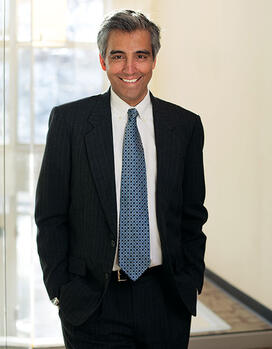
Princeton’s Career Services office is getting a makeover. A new executive director who arrived in December has brought a fresh approach and a new vocabulary, drawing on self-exploration exercises and matchmaking-service-inspired technologies to overhaul the way the University helps students find their careers.
Pulin Sanghvi’s mission is “to help each student define a unique and compelling career and life vision,” he said. He wants them to become “empowered to go well off the beaten path.”
Before arriving at Princeton, Sanghvi was director of the Career Management Center at Stanford’s Graduate School of Business, from which he has an MBA. He began his career as an analyst with Morgan Stanley and also worked at the consulting firm McKinsey & Company before founding a career-advising practice, Ivy Strategy.
Responding to criticism raised by some that too many Princeton students head for jobs in consulting and finance, Sanghvi said the office will “dramatically expand” the options for students, particularly in the arts, nonprofit organizations, and the public sector. Because these groups are less likely to conduct traditional on-campus recruiting, he intends to improve outreach by “re-imagining how we facilitate connections between students and alumni.”
Part of that effort, he said, will be to match students and alumni for mentoring employing a strategy like the one used by the online matchmaking service eHarmony, which relies on state-of-the-art algorithms to recommend pairings. The way universities have approached matching alumni with students has been “very hit or miss,” Sanghvi said. His office’s online tools will improve that by suggesting matches that are not intuitive, he explained. Another priority for Career Services will be reaching out to graduate students, he said.
Sanghvi leads a workshop on “career and life vision” for students that involves exercises in self-understanding, rather than nuts-and-bolts advice about résumé-writing and interviewing techniques.
In a recent session, he asked students to identify their “limiting beliefs.” Examples provided in a workbook included “I want the work I do to have social impact,” “I don’t want to work 100 hours a week,” “I can’t take this role — it’s not prestigious enough,” and “I went to Princeton, and now I have to earn as much money as my classmates.”
Sanghvi said he hopes all students will take the workshop, which is peppered with inspirational stories about sports figures such as Muhammad Ali and Michael Jordan. He suggested students manage their lives as a CEO would, considering time their scarcest resource, and urged them to specialize early in order to develop areas in which they excel.
Students have been enthusiastic. “This workshop has helped me realize that there are unconventional paths that one can take — not only those you’re supposed to take — which are extremely valid and valuable,” said Ginevra Guzzi ’17. She found useful an exercise that involved selecting 12 occupations she thought were exciting and meaningful, without considering financial rewards or whether she had the skills to perform them well.
Thomas Garcia ’16, a prospective English major, said the session reaffirmed his confidence in his current career path, in education. “The workshop not only helped me re-evaluate where my passions lie, but also why they exist in the first place.”
In addition to giving workshops, Sanghvi has plunged into campus life, signing on as a fellow in all six residential colleges and as an academic-athletic fellow for the football team. His plan, he said, is to become “really visible in the lives of students.”












No responses yet